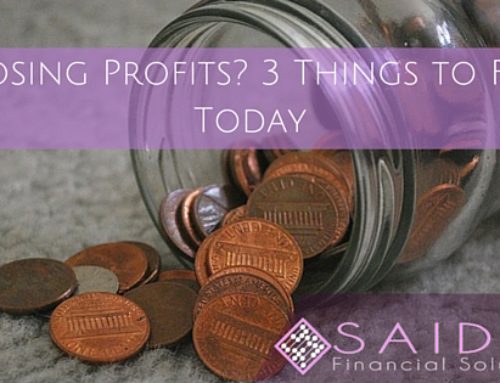While it may not seem it like at first, it really is important to keep separate accounts for business and personal transactions. In fact, it’s recommended that you open a small business account before you send out that first invoice to a paying client.
You might think, “Hey, I’ll get to it when I can. I’m too busy” or “I’ll just keep up with the transactions that are business related”. But if you have money going in and out for any length of time and you’re busy trying to grow your business, you’ll find less and less time to separate out business transactions from your personal bank account. Save yourself time and energy up front. Part of being efficient is avoiding unnecessary extra work!
A business checking account is simple to open. Most financial institutions have affordable minimum deposit requirements, usually in the $25 to $50 range. There are a few online banks that don’t require as much, but you must do your research and be sure to note any monthly fees or requirements. This helps to ensure that there won’t be any “money mix-ups” in the future.
So why is it best to maintain separate accounts? Here are some reasons:
Creating a Professional Image
In order to start and continue building a successful business, a professional image is vital. First and foremost, it gives your customers a sense of security. Even with the growing trend to freelance, many people are still leery of paying for services by writing checks out to an individual, as opposed to a business. It’s a perception not easily eliminated even today. Not to mention, separate accounts also minimize the possibility of creditors making a claim against your personal assets.
Building Business Credit
Building business credit may not be something you’re thinking about right away. However, it’s very important to do so, especially as the business grows. A business credit card gives you more borrowing power, allows you to scale up by helping you get funding for supplies, equipment, and etc. that you’ll need to manufacture more inventory if that’s how your business is set up.
In the event that your personal credit score is low at the time you’re starting your small business, don’t give up. There are many ways to raise your score over time. If you’re looking for direction with building your credit, here are some friends of mine that can help: Tiffany Aliche, Netiva Heard, and Dominique Brown. Once you qualify for a business credit card or line of credit, you’re able to deduct the interest as a business expense.
Protecting Personal Assets
If you choose to operate an LLC, separate accounts prevent you from becoming personally responsible for any unpaid debts your business may be incur. Think about it, if the court system can’t distinguish between your personal and business finances, it will most likely rule that your personal assets will be seized to pay off the debt. But just setting up an LLC is not enough to protect your personal assets. Taking the time and effort to open a business account might save you from a devastating situation in the future by creating a clear distinction between what belongs to the business and what belongs to you personally.
Surviving Tax Season
Maintaining separate business and personal accounts will help you save time and money when it comes time to prepare your taxes. If all of your finances are combined together, it makes it that much more difficult to sort things out for tax purposes. You’ll end up spending alot of time going through bank statements, trying to tally up what business expenses you paid for out of your own personal account.
The Small Business Administration suggests setting money aside for taxes on a regular basis. This is especially true if you intend paying your taxes on a quarterly basis. Keeping money in a business account prevents you from having to tap into your personal account to pay Uncle Sam. In addition, a savings account will allow you to further allocate money towards taxes, ensuring that you have the funds available when it’s time to pay them.
These are just a few of the main reasons for keeping your small business transactions separate from your personal spending. The earlier you separate things, the better of a chance your business has to maintain accurate records. For help with this or any other part of creating a solid accounting system for your business, check out our Entrepreneur Startup Checklist for even more tips.








